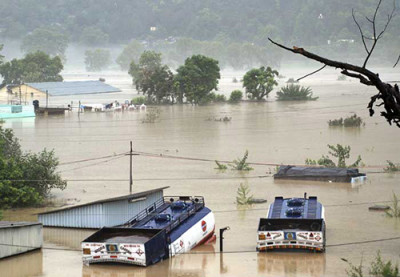The missing economic risks in assessments of climate change impacts

Downloads
In order to make well-informed decisions on climate change action, leaders need to understand clearly the nature and magnitude of the risks to lives and livelihoods that are being created by climate change. Unfortunately, much of the technical advice and recommendations about these risks incorporate assessments of the economic implications that omit or underplay the largest potential impacts of climate change.
This policy insight seeks to identify and draw attention to these missing and under-represented risks. The authors also discuss how populations might fare in light of their potential to adapt in the face of these risks. When the risks are taken into account, the case for strong, deliberate and urgent action to reduce greenhouse gas emissions becomes even more compelling.
Summary points
- Economic assessments of the potential future risks of climate change have been omitting or grossly underestimating many of the most serious consequences for lives and livelihoods because these risks are difficult to quantify precisely and lie outside of human experience.
- Political and business leaders need to understand the scale of these ‘missing risks’ because they could have drastic and potentially catastrophic impacts on citizens, communities and companies.
- Scientists are growing in confidence about the evidence for the largest potential impacts of climate change and the rising probability that major thresholds in the Earth’s climate system will be breached as global mean surface temperature rises, particularly if warming exceeds 2°C above the pre-industrial level. These impacts include:
- Destabilisation of ice sheets and glaciers and consequent sea level rise
- Stronger tropical cyclones
- Extreme heat impacts
- More frequent and intense floods and droughts
- Disruptions to oceanic and atmospheric circulation
- Destruction of biodiversity and collapse of ecosystems
- Many of these impacts will grow and occur concurrently across the world as global temperature climbs.
- Some of these impacts involve thresholds in the climate system beyond which major impacts accelerate, or become irreversible and unstoppable.
- When a threshold is breached, it might cause one or more other thresholds to be exceeded as well, leading to a cascade of impacts.
- Many of these impacts could exceed the capacity of human populations to adapt, and would significantly affect and disrupt the lives and livelihoods of hundreds of millions, if not billions, of people worldwide.
- These impacts would also undermine economic growth and development, exacerbate poverty and destabilise communities.
- Economic assessments fail to take account of the potential for large concurrent impacts across the world that would cause mass migration, displacement and conflict, with huge loss of life.
- Economic assessments that are expressed solely in terms of effects on output (e.g. gross domestic product), or that only extrapolate from past experience, or that use inappropriate discounting, do not provide a clear indication of the potential risks to lives and livelihoods.
- It is likely that there are additional risks that we are not yet anticipating simply because scientists have not yet detected their possibility, as we have entered a period of climate change that is unprecedented in human history.
- Some advances are being made in improving economic assessments of climate change impacts but much more progress is required if assessments are to offer reliable guidance for political and business leaders on the biggest risks.
- The lack of firm quantifications is not a reason to ignore these risks, and when the missing risks are taken into account, the case for strong and urgent action to reduce greenhouse gas emissions becomes even more compelling.

